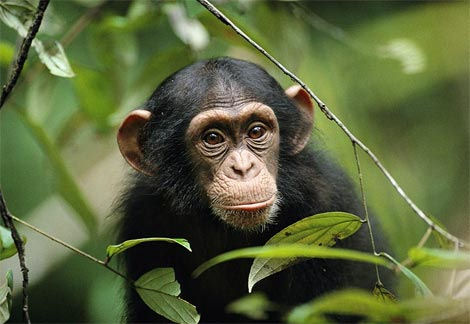Institutionalised cruelty to lab-chimps in USA exposed by US Humane Society
Introduction:
I find it incongruous - to say the least - to think that the humans are sitting in armchairs watching t.v., driving cars, eating with their partners and children, leading affluent lives on the basis of earnings from the industrialised depravity - nazi-like in its cleanly-institutional style - we see in the video.
Go on, have a look; it's not that kind of video

original photo by Michael Nichols at http://animals.nationalgeographic.com/staticfiles/NGS/Shared/StaticFiles/animals/images/primary/chimp-peeking-through-leaves.jpg
But it's also nothing like the photograph above of a young chimpanzee free in his natural surroundings.
The video does not contain intentional torture. It shows many chimpanzees and monkeys in bare cages with concrete floors, who are kept there for many many years. They are powerless and frightened. Baby chimps are bred there and taken from their mothers for experiments. You don't see the experiments, but you do see the animals restrained and a baby chimp crying as blood is being taken from it or it is being given a drug. You also see animals thrown roughly down on hard operating tables. Most of all you see a great deal of barren cleanliness with living creatures confined like criminals in tiny cells as masked and gowned staff go about 'just following orders' no doubt. One chimp was taken from the wild 25 years ago and has lived in concrete cells since then, apparently.
This situation is a reflection of the hardness of US society where keeping a job requires uncritical subservience. It also reflects the kind of ignorance that many people thought had disappeared with the Victorian era of tiny zoo-cages, or because we have all become 'civilised' in the western world, due to ... ahem... human 'progress'...
Political engagement against dystopia
But, yes, we do live in a world where this is going on all the time for other animals for food production, and the US has something like 7 million human beings confined in prison cells as well. But being surrounded by industrialised cruelty is not an excuse to give up. It is all the more reason to protest - because not to do so depraves us all. When we are all depraved, accepting this as normal, then there is no hope and we have all become part of the machine.
How to register your disgust
Here is a link to a form you can fill in to send automatically to US legislators if you live in the US. Alternatively, you could just look up your US embassy and send them an email with a copy to the US Humane Society, at this email address: humanesociety[AT]hsus.org. I sent a copy of this article to the Melbourne-based US embassy. You might also email a copy to the NIRC itself: NIRCadmin[AT]louisiana.edu
Anyone associated with this research, especially those in charge of it, in my opinion, should be stripped of their assets gained through such unacceptably callous exploitation. We need names and faces to pin to these atrocities. Anonymity is what keeps such practices going.
It would be much harder to condemn the New Iberia Research Center (NIRC) in Louisiana if the institution had obviously made a great effort to compensate these animals by giving them trees and a lovely environment between 'sessions'. But they have confined these forest creatures to an environment as friendly as a toilet block for life.
What sort of rectal human phenomena would do such a thing? I simply do not know, but I guess someone emotionally dead and fixated on material survival. Or perhaps someone who actually believes that non-humans have no feelings or worth. Unfortunately a lot of humans have become like that and the rest of us have to try to fix up the damage they do everywhere.
The story is from the Humane Society of the United States, which has a lot more clout than the Australian RSPCA. Supporting them will probably lead to a real improvement in this problem.
Story accompanying the video (informative, not schlocking)
A nine-month-long undercover investigation by The HSUS has exposed the mistreatment of nearly 300 chimpanzees and other primates at the New Iberia Research Center (NIRC) in Louisiana. These chimps, living lives of deprivation and misery, are among the more than 1,000 chimps languishing in laboratories across the United States. Chimps, our closet genetic relative, are complex, social, and long-lived creatures. Many chimps currently warehoused in research facilities have lived for decades behind bars. Especially heartbreaking are stories of the 26 elder chimps at NIRC, who were taken from their mothers in the wild.
The Great Ape Protection Act (H.R. 1326) has just been re-introduced in Congress. This legislation aims to end invasive research on the chimpanzees remaining in laboratories, retire the approximately 500 federally-owned chimpanzees to permanent sanctuary (including the elder chimps at NIRC), and make the recent decision by the National Center for Research Resources (part of the National Institutes of Health) to stop funding the breeding of federally-owned chimpanzees permanent.
The United States is the only country, besides Gabon, that still uses chimpanzees in invasive research. The United Kingdom, Japan, Sweden, Australia, New Zealand, Austria, the Netherlands, Belgium, and Spain have all banned or severely restricted the use of chimpanzees. Please help the U.S. join this list of nations by co-sponsoring The Great Ape Protection Act.
Something else you can do - sponsor a chimp via the Jane Goodall program!
The Jane Goodall Institute of Australia has launched a Guardian Program where you are able to:
* become a caretaker of a chimpanzee, an orangutan or a gorilla;
* support the Lwiro Sanctuary in Congo;
* assist their tree planting efforts in Tanzania.
That is a good idea and we need it for koalas and kangaroos (among other victims of human expansion) in Australia as well.

Recent comments